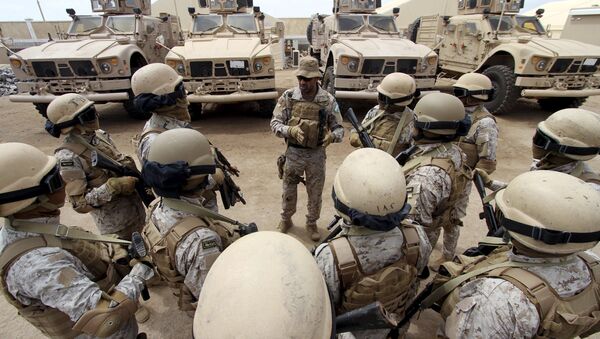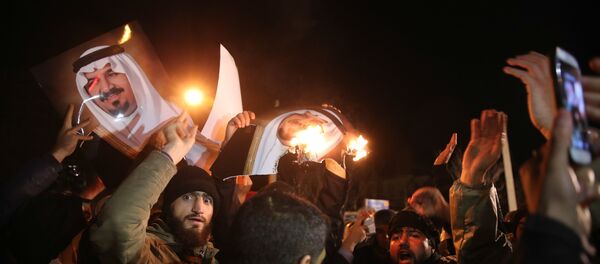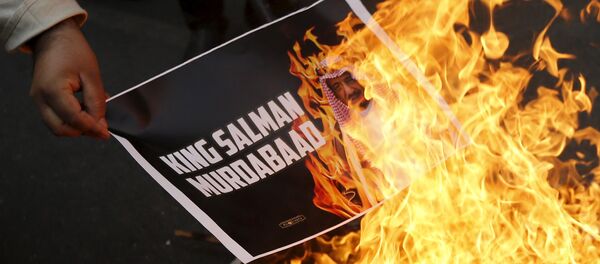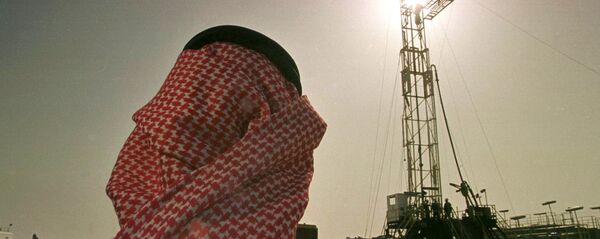Saudi-Iranian tensions continue to escalate; although Riyadh keeps asserting the international community that it has no intention to push Saudi Arabia to the brink of war, there are certain preconditions for a full-scale conflict, according to author Daniel Lazare.
"The ruling family is under unprecedented strain. Its economy is shrinking; it's bogged down in a seemingly endless war in Yemen; and its human-rights policies are an international scandal. If countries could have nervous breakdowns, Saudi Arabia would be well on its way. And when breakdowns occur, nations do crazy things," Lazare writes in his piece for Consortiumnews.com.
Another reason is the Iranian nuclear deal, approved by Washington.
"Like Israel, Saudi Arabia was overjoyed when the United Nations Security Council imposed trade sanctions on Iran in 2006 for refusing to suspend its uranium enrichment program," the expert underscores.
Not only did the restrictions isolate Tehran politically and economically, but they cut off Iran from the oil market, playing directly into Saudi Arabia's hands. Now Iran is back.
To complicate matters further, the Saudi-American relationship is bursting at the seams. Riyadh has no scruples about openly demonstrating its growing discontent with Washington's Middle Eastern policy. At the same time, the Saudi monarchy has reacted harshly to a few attempts of mild criticism from the White House.
The author underscores that the Bush invasion of Iraq upset the delicate balance between Sunni and Shiite groups in the Middle East indirectly facilitating the rise of Iran.
"From a Western perspective, the Sunni-Shiite conflict makes no sense," Lazare remarks, but for the Saudis "this is no laughing matter."
"As the self-appointed 'custodian of the two holy mosques,' i.e. Mecca and Medina, the Saudi royal family bases its claim on Muslim law, the notion that its rule is legally valid according to Sharia and that it is therefore incumbent upon all Muslims to accede to its legitimacy," the US author explains, stressing that at the same time for Shiites the House of Sauds is just a "pack of illegal Sunni usurpers with zero legitimacy."
Meanwhile, the emergence of Daesh (Islamic State/ISIL) has added insult to injury. Although the generous Saudi donors have long been fueling Sunni extremism in the region, Riyadh is definitely unwilling to fall victim to new Islamist "Caliphate." However, Saudi youths are joining the terrorist organization at steady pace.
On the other hand, in the eyes of Saudi Wahhabi imams Daesh is doing the "right thing" it is eliminating Shiites and "apostates." Since the royal family's legitimacy is largely based on Saudi Wahhabi clergy, it "has no choice but to go along."
The last but not the least thing is Saudi internal dynamics, Lazare emphasizes.
The 80-year-old Salman bin Abdulaziz is a "hardliner" comparing with his predecessor. Furthermore, the Saudi King has handed real power over to his favorite young son, Mohammad bin Salman.
"The results have been disastrous. Brash, inexperienced, and ill-informed, Mohammad did not study abroad — very unusual for scions of the Saudi elite — but instead gained a bachelor's degree from King Fahd University in Riyadh, a snake pit of racism, backbiting, and petty tyranny," according to Lazare.
"Saudi Arabia was 'prepared to take unprecedented military, financial and political risks to avoid falling behind in regional politics'," the BND report stated, according to Deutsche Welle.
Although the Saudi Deputy Crown Prince insists that Saudi Arabia is not seeking a direct conflict with Iran it seems rather possible that mounting internal and external pressures will push Riyadh in that direction.
"With its own catastrophic collapse looming, the kingdom may lash out at its prime enemy first," Lazare stresses.
Remarkably, Tehran is by no means interested in escalating further tensions with Riyadh, according to J. Matthew McInnis, a Resident Fellow at the American Enterprise Institute. In his article for The National Interest the scholar emphasized that there are a number of signs demonstrating that Iran wants to avoid direct confrontation.
"Tehran is very unlikely to initiate direct conflict with the Gulf States, however, and will try to limit any further escalation. Iran knows it blundered after al-Nimr's death and will be unwilling to risk further isolation and diplomatic damage in the face of the Saudi-led reaction in the region," J. Matthew McInnis stressed.




